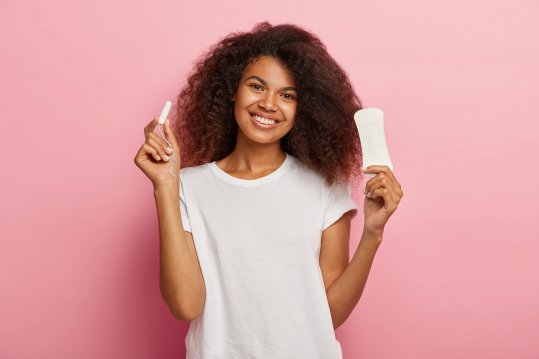Our bodies: incredible machines

Every one of us, women, bleeds for a few days roughly every month. What do we do then? We buy tampons, pantyliners, pads and other hygiene products. Sometimes, we stay at home due to the pain and if we feel good, we carry on as usual. Besides, we note down the period start date in the calendar, diary or on the phone and talk to our female friends and share experiences. It is time to ditch the notion that periods are a taboo.
What are monthly periods exactly?
The menstrual cycle comprises four phases: menstruation, the follicular phase, ovulation and the luteal phase. Menstruation starts on the first day of bleeding. The uterus lining called ‘endometrium’ sheds during that time. The follicular phase is marked by reduced hormone levels, in this case, progesterone and estrogen. This is when what is known as Graafian follicles mature in the ovaries; these are the ‘walls’ of an egg that is capable of being fertilised. Once a follicle breaks open, you can get pregnant. In the next phase, i.e., ovulation, the hormone levels rise. As the uterus gets ready for pregnancy, its internal lining called ‘endometrium’ grows thicker. Then, it divides and becomes covered with a network of blood vessels. This makes it capable of accepting a fertilised egg. In the last phase, i.e., the luteal phase, the ruptured Graafian follicle transforms into a corpus luteum and its cells start to produce progesterone and estrogen. If the woman does not get pregnant, the endometrium sheds and bleeding occurs.
Normally, we are on the period for 4 to 6 days but it can last for about a week or longer. The quantity and colour of the blood may vary. It begins with light spotting and the colour becomes brighter and red as the days pass. There should be no clots in a normal period, but if these occur, it is a good idea to see a doctor. During a visit, the gynaecologist will always ask for the date when the last monthly period started. This is exactly when a new menstrual cycle always begins. In medical practice, it is accepted that a normal cycle is 28 days but this is a myth. A significant proportion of women menstruate irregularly and this is absolutely normal. However, if the intervals are extremely shortened or prolonged, it is always worth consulting the doctor, who will check for any menstrual disorders.
Period: neither friend nor foe
Stomach-ache, nausea, diarrhoea, dizziness ... periods can be very unpleasant. The reason is the overproduction of the hormones responsible for uterine cramps. In an emergency, methods such as a heated compress, tea or mild muscle relaxer can help. You may wish to visit a gynaecologist to check if there are any more serious causes that require treatment. Pain may be caused by, e.g., endometriosis, recurring vaginal infections or muscle knots. It is important to change pads or tampons regularly during the period. Preferably use natural and dye-free ones. Lately, many women have started to use menstrual cups. Menstrual cups are both environmentally friendly and cost effective.
Period? Don’t be embarrassed! We all go through it differently. During ‘those days’, some women cuddle up under a blanket, snack on their favourite foods and binge-watch shows. Other go running, cycling or swimming. The key to acceptance of your period is, above all, to understand its underlying mechanism. You may want to embrace it as it is a normal body function. In her book ‘I’ve Got My Period. So What?’, Clara Henry writes that tampons were already known in ancient Egypt; they were made of softened papyrus. In the Victorian era, wool and sanitary napkin belts were used. Although we live in the 21st century, some parts of the world still struggle with access to hygiene products. This is called ‘period poverty’ and affects not only low-income countries. Apparently, one in ten female Europeans have experienced period poverty. More to the point, one in five Polish women struggle to buy appropriate menstrual products.
It’s worth understanding (and loving).
No woman should have problems with access to sanitary products. Similarly, a period itself should not be a taboo subject. To demystify the topic a bit, the Kulczyk Foundation has been actively involved in community outreach, e.g., by preparing educational materials for schools. A survey commissioned by the Kulczyk Foundation has revealed that an astounding 64% of Poles support the idea of free sanitary supplies for girls at schools. On top of that, two years ago the issue of menstruation first made it to the Sejm owing to the efforts of the Periodic Coalition. The process has continued right up to today, when the Periodic Coalition has tabled Poland’s first draft law addressing the topic. For more, please refer to the website at: takdlapodpasek.pl.
A survey conducted by the Kulczyk Foundation shows that every fourth woman holds a very negative attitude to periods.
One of the Periodic Coalition leaders is Dominika Kulczyk, President of the Kulczyk Foundation. The Foundation has been instrumental to the launch of the first TV commercial in Poland to talk about menstruation. It aims to persuade politicians to enact a law on free pads at every school. The spot will run both on TV and across social media channels such as Facebook, Instagram, TikTok and YouTube. What is it about? This is a story of girls and women with two things in common: school and periods. Watch the full uncensored version of the commercial on TakDlaPodpasek.pl. The production is proof that every one of us, girls, deserves to menstruate in dignity. Without shame or questions: will I find a pad whenever and wherever I need it? Hopefully, such sad situations will soon become a history.
KATARZYNA RAPCZYŃSKA-LUBIEŃSKA
More about the programme: http://takdlapodpasek.pl
The text was published on https://takdlapodpasek.wp.pl/

